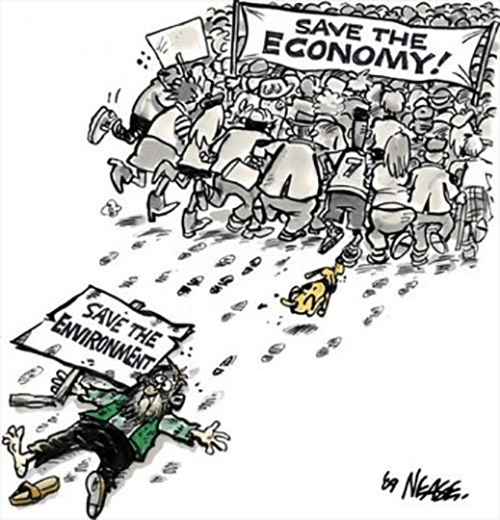On 6 May 2019 a landmark UN-backed report on biodiversity confirmed what has been obvious for decades: humanity is destroying life on earth, and endangering its own existence in the process.
Some of the main conclusions of the report are that there is overwhelming evidence that human activities are behind nature's decline, that drastic change is urgently needed and that society needs to move away from chasing economic growth.
According to this very authoritative report (based on a review of about 15,000 scientific and government sources and compiled by 145 expert authors from 50 countries) the current state of our natural world is disastrous and only getting worse. A few examples:
- Around 1 million animal and plant species are now threatened with extinction, many within decades
- Since 1980 greenhouse gas emissions have doubled
- Three quarters of the land-based environment and about 66% of the marine environment have been significantly altered by human actions
- Land degradation has reduced the productivity of 23% of the global land surface
- Many global crops are at risk from pollinator loss
- 100-300 million people are at increased risk of floods and hurricanes because of loss of coastal habitats and protection
- Urban areas have more than doubled since 1992
- Plastic pollution has increased tenfold since 1992
- Hundreds of millions of tons of heavy metals, solvents, toxic sludge and other wastes are dumped annually into the world's waters and fertilizers have produced more than 400 ocean "dead zones" (i.e. areas where life is no longer possible), totalling more than 245,000 sq.km.
Incomprehensibly, humans have seldom treated the environment with the respect it deserves. According to another major study from 2018 we were already doing serious harm to the natural world in prehistoric times. Some of its findings are:
Human activity contributed to the Quaternary Megafauna Extinction between 50,000 and 3,000 years ago, which claimed around half of the large (>40 kg) land mammal species. The biomass of wild land mammals before this period of extinction was estimated to be seven times higher than it is today. Intense whaling and exploitation of other marine mammals have resulted in an approximately fivefold decrease in marine mammal global biomass. While the total biomass of wild mammals (both marine and terrestrial) decreased by a factor of 6, the total mass of mammals increased approximately fourfold due to the vast increase of the biomass of humanity and its associated livestock.
The impact of human civilization on global biomass has not been limited to mammals but has also profoundly reshaped the total quantity of carbon sequestered by plants. A worldwide census of the total number of trees, as well as a comparison of actual and potential plant biomass, has suggested that the total plant biomass (and, by proxy, the total biomass on Earth) has declined approximately twofold relative to its value before the start of human civilization. The total biomass of crops cultivated by humans accounts for only 2% of the extant total plant biomass.
It is estimated that we have caused the loss of 83% of all wild mammals and half of the plants.
From: The biomass distribution on Earth by Yinon M. Bar-Ona, Rob Phillips, and Ron Milo
All this means that there is no longer any reasonable doubt that the devastation of our planet is caused by human activities. Especially harmful are economic activities that directly affect the natural world, such as fishing, farming, forestry and mining but the simple truth is that, apart from a few rare exceptions, all human activities harm the environment. Anyone with a basic knowledge of nature and evolution will understand this.
Before we appeared, 500 million years of evolution had brought the natural world to a state of near perfection, fully sustainable and finely balanced. Any disruption of that balance could only be detrimental. Humanity became the great disrupter and in spite of all our boisterous claims of superiority we have never managed to find a way to restore the balance.
The most reliable indicator of the current impact of our activities is our ecological footprint. It measures the human demand on nature. If it is 1, the impact is neutral, anything above 1 is detrimental to the environment.
Globally our ecological footprint now stands at 1.7, which means that it is 70% too high. But in many developed countries it is dramatically higher. Some examples:
| Country |
Footprint |
| Australia |
6.6 |
| Canada |
7.7 |
| China |
3.6 |
| Germany |
4.8 |
| Japan |
4.5 |
| Russia |
5.2 |
| U.K. |
4.4 |
| U.S. |
8.1 |
(These figures are from 2016; they may have changed by a few tenths of a percentage point)
This is obviously beyond madness. It is criminal. And yet, most of these countries still labour under the delusion that their environmentally destructive economies must grow even further.
The relatively low figure for China is deceptive, because of its large number of poor people in comparison with other economic powerhouses and because it does an increasing amount of its environmental harm abroad. Needless to say that its Belt & Road Initiative poses enormous threats to the environment, both directly and indirectly. Australia is another country that is failing miserably. In spite of its already huge footprint "economic interests still dominate decision making," according to a recent review by the OECD. The USA is a tragedy in itself, dragged ever further into the abyss of environmental destruction by its current administration.
In a sane world this report (and many others before it) would have led to a global state of emergency, spurring the international community into immediate action. In ours it is not even taken seriously. This vital and ominous message only received a few minutes' attention on the major news channels. Since then it has largely been ignored, in favour of subjects so trite and irrelevant that it defies belief.
In a recent Gallup poll 18% of Americans thought economic issues were the most import problem facing the country. Only 2% thought it was the environment/pollution/climate change.
This means that 98% of Americans don’t know the first thing about the world they live in. The environment is immeasurably more important than the economy. The one is just a limited collection of human activities. The other is the whole external world, the source of everything that we are and everything that we have, including the economy. In the words of one of the scientists of the biodiversity review: it is our life-support system.
Nevertheless, the delusion that the economy is more important persists, as a myth created (not surprisingly) by economists and the business community that they serve.
Its folly is easily shown.
Right now the harm done to the environment is already killing millions of people a year and those numbers are certain to rise dramatically in the near future. If, for instance, we continue to deplete the oceans, more than one billion (1,000,000,000) people will lose their main source of food.
Economic recessions certainly cause hardship and distress but very rarely mass fatalities, and are usually followed by recovery within a few years.
Even during the worst economic crisis in the USA, the Great Depression, very few people starved. There was indeed a marked increase in suicides from 17.0 per 100,000 in 1929 to 21.3 per 100,00 in 1932, but this was completely offset by improvements in health and life expectancy. Several recent studies have shown, unexpectedly perhaps but factual nevertheless, that health and life expectancy always improve during economic downturns and always get worse during economic expansion.
The conclusion is therefore crystal clear. Economic growth is disastrous for the planet and not very good for the average human being either. Most of the financial benefits that it brings, go to the usual suspects, the eco-criminals: the big corporations, bankers, crooked politicians, and their accomplices.
Theoretically, a total collapse of civilization might still be prevented (always assuming that climate change can be stopped, which is by no means certain). A sustainable economy is possible, but that would require a complete overhaul of society, which is unlikely to happen because current societies are controlled by the very people who don’t want anything to change: the same eco-criminals who are doing the harm and have successfully been fighting limits to growth since the 1960's.
So, realistically, there is little hope. Even if by some miracle humanity should come to its senses and unite to tackle this immense problem, success is by no means assured.
There are grave consequences to thousands of years of abuse, culminating in a veritable orgy of destruction during the last century or so. Everything comes at a price and the price of reviving a dying planet is truly astronomical. It will beggar the world economy but it's either that or Armageddon. The only choice is between frugality or death.
First and foremost we must instantly stop the ongoing destruction, no matter what the cost. Whole sectors of the economy will have to be phased out, because the only viable society is a sustainable one, a society that does not take more from nature than it can replace. That's the only realistic solution. All the other routes are dead ends, literally. If that means no more fossil fuels, no more plastics and no more toxic chemicals, so be it. There is no alternative. We either accept a much simpler lifestyle or we perish.
It will certainly mean hardship. Given our inventiveness we might just manage to survive at an elementary level. But it will take a special kind of wartime mentality, a willingness to make huge personal sacrifices for the common good.
Yet one more irony remains. As the towers of the mighty begin to crumble, and the rich are reduced to lifestyles for which they are woefully unfit, it might well be that the poor, hardened by their daily struggles, and especially indigenous people, will have the best chances of survival.
"In questions of science, the authority of a thousand is not worth the humble reasoning of a single individual."
Galileo
"The planet is not dying. It is being killed. And those killing it have names and addresses"
Utah Philips
"The evolution of population health during the years 1920–1940 confirms the counterintuitive hypothesis that, as in other historical periods and market economies, population health tends to evolve better during recessions than in expansions."
Tapia Granados and Diez Roux



